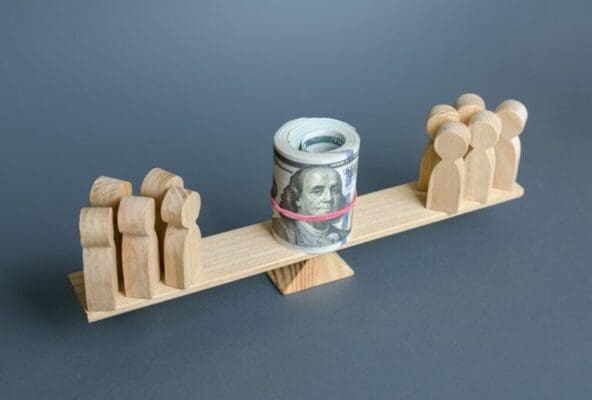Podcast: Play in new window | Download
Discussing the New Normal and Impending Supermarket War
Join Andrew Grant and Darren A. Smith in the eighteenth episode of Grocery Guru. Today, the discussion focusses on the new normal and preparing for a fierce supermarket war. Forecasting budgets will be very hard, and the only certainty is uncertainty.
You Can Read the Full Supermarket War Transcript Below:
Darren A. Smith:
Welcome to episode 18 of Grocery Guru. And we’re here with that guru, Andrew Grant. How are you?
Andrew Grant:
Morning, Darren. You well?
Darren A. Smith:
I’m good, I’m good. I saw Boris’ announcement like most of the UK on Monday night. And the new normal… I’m confused. Andrew, what’s going on? What’s going to happen?
Andrew Grant:
Well, if I knew that I don’t think I’d be here. I’d be putting some bets on the stock market. Yeah, it’s all a bit weird, isn’t it? It’s like being handcuffed and you see the key at the other end of the room. It’s like one of those Jeopardy movies.
Darren A. Smith:
Very nice. Very good.
Andrew Grant:
Or the Escape Room, or whatever it’s called, where you can see how to get out, but you’re not allowed out. It’s a little bit weird.

Darren A. Smith:
I hear lots of contradictions around. This guy says this and this other person says that. And it’s like…
Andrew Grant:
Yeah, when you look at the game we’re in, it is a bit strange. On the one hand, you’ve got the head of Network Rail saying, “We’re going to put 10% fewer trains on, because we’re expecting 80% of normal capacity.”
Darren A. Smith:
Right.
Andrew Grant:
Then you’ve got the head of Goldman Sachs saying, “Nah, everybody’s going straight back to work the minute we can.”
Darren A. Smith:
Right.
Andrew Grant:
So, that’s a bit contradictory.
Darren A. Smith:
Yeah, yeah.
Andrew Grant:
And then you’ve got another thing saying footfall in shops will go up 50% post lockdown.
Darren A. Smith:
Plus 50%?
Andrew Grant:
Yeah.
Darren A. Smith:
Wow.
Andrew Grant:
And everybody talking about this massive spending spree. £250 billion pent up savings. So, it sounds like people are just going to go mental, which I imagine they will.
Darren A. Smith:
Wow. Because we’ve got the four-step plan coming over the next few months. Everyone knows that. So, we’re going to talk about that. So, when’s this £250 billion going to start being spent? Are we thinking during March or they’re going to wait for a few steps?
Andrew Grant:
Well, I forget the exact dates. When non-essential retail opens. So, when all the clothing shops and the department stores and what have you open up, that’ll be a big trend in spending. But obviously, the big one will be when pubs and restaurants will start serving again in… Is that May I think?
Darren A. Smith:
17th of May I think.
Andrew Grant:
Yeah.
Darren A. Smith:
That’s five days after my 50th birthday, so you won’t be able to pick me up.
Andrew Grant:
Okay, okay. There’s the push for a card I could see. No, but what I found fascinating, coming back to our game and supermarkets and what have you, is they have been one of the clear winners of this pandemic because they’re about the only place you can go.
Andrew Grant:
And I was looking at the Kantar data for January, which is obviously a slow month in normal retail land, but the grocers were up 12% year on year. Now there’s bugger all inflation so that 12% is all growth. And of course, you imagine most of it’s come from pubs, restaurants, and hotels.
Andrew Grant:
So, in 12 weeks, that’s worth about a £3.6 billion bonus to the supermarkets, which is £16 billion a year. Round, round numbers. Now obviously, if that all suddenly goes back to what we call out of home, then they’ll be in zero growth territory after a year where they’ve spent a fortune on being COVID prepared and dealing with the massive growth of online deliveries.
Andrew Grant:
I wonder what they budgeted for this year, because not only could they potentially lose that 12% growth, it could be a big-time the other way if people just decide, “Right, we’re eating out all the time, because we’ve got a whole year of not doing it.”
Darren A. Smith:
Well, that’s very true. So, if you’re a buyer looking next year back at this year, you’re going to be down year on year. You budgeted probably up. You’re going to come out to the suppliers with your begging bowl. It could be tough.
Andrew Grant:
Well, yeah, you’re exactly where I am, Darren because I think exactly that. Because in a normal year, you’ve got… What? 160 categories in a supermarket. Yeah, some of them are going to be affected, because there was a royal wedding last year, or it was the World Cup last year. And you always budget for that like for like dip the next year. But the problem they’ve got this year is they’ve got the world’s biggest like for like spike as a result of COVID, which potentially won’t be there this year.
Darren A. Smith:
Yeah, yeah. That’s right.
Andrew Grant:
And you never budget for reduced costs, do you? Because think of all the transit vans they’ve bought to do home deliveries. So, you’ve got costs going like that. You’ve got your potential like for like sales going like that. Who’s going to make up that gap? I can bet you 10 pounds of your own money who they’ll go to.
Darren A. Smith:
And this is going to create a very fierce competitive supermarket world next year while they all try and fight to get back to where they were.
Andrew Grant:
Well, I think it will. I think it will. It’s almost like an artificial gap because the last year of supermarkets was a bonus if you can put it that way.
Darren A. Smith:
Yeah, yeah.
Andrew Grant:
But effectively a non-repeatable bonus, but business bake in what they take. So, yeah, I imagine it’ll be a massive scrap to retain as much of that as possible, because if people are determined they’re going to go and spend the money in the pubs and the restaurants, and what have you, then they’re determined to do it. You’re better off stealing your business from your nearest competitors to shore up the sales line. It’s going to be really interesting.
Darren A. Smith:
And the bluntest tool to do that is always price.
Andrew Grant:
Say that again? Sorry. Oh, well, yes.
Darren A. Smith:
And the bluntest tool to do that is always price.
Andrew Grant:
Yeah.
Darren A. Smith:
Now we’ve also got in the midst of this, Asda just announced a bunch of potential job losses, haven’t they?
Andrew Grant:
I think that’s just all part of the mix. 3000 losses, but maybe job transformations into more forward-facing roles. So, yeah, a big restructure, because online is growing so fast.
Darren A. Smith:
Yeah, yeah.
Andrew Grant:
So, just following the trend that most of the others have jumped on in the last year.
Darren A. Smith:
Let me just add into this. I’ve got a report here. It’s come across the MBM desk from Dojo, one of those payment guys where you tap your card on the thing that the barman hands you.
Andrew Grant:
Oh, yeah?
Darren A. Smith:
These guys are new on the market. What was that?
Andrew Grant:
I said, “All right.” I was showing a bit of interest.
Darren A. Smith:
And what these guys have said is they’ve looked at the 500 companies across 36 markets and they’ve looked at something called purchase intent. Now the bits that are sticking out here for me are home furnishing is up 458%. Okay.
Andrew Grant:
Yeah, everybody’s bought a bed or a sofa in lockdown.
Darren A. Smith:
That makes absolute sense.
Andrew Grant:
There’s no point in getting up in the morning.
Darren A. Smith:
The second one is mail-order catalogues. Studio cards, I guess. Yeah, okay. All right, yeah, I get that. The one that I don’t get is the fifth one is silver, but I think this is looking at company performance as opposed to absolute purchasing. The 18th one is copper.
Andrew Grant:
Right. That’s strange.
Darren A. Smith:
It’s very odd. But here’s one of the biggies, what we’re going to see is a huge hike in camper vans.
Andrew Grant:
Well, yeah, staycation has been… Supposedly Cornwall and Devon are sold out for July and August. Yeah, a bit like last year. One thing that you could not buy, canoes and kayaks and paddleboards for love nor money.
Darren A. Smith:
Well, that actually that ties into sporting equipment was up I think 110%, which makes absolute sense.
Andrew Grant:
And then the biggest queues our summer in our village was outside the bicycle shop. People and the deliveries of new bikes every week was staggering.
Darren A. Smith:
Yeah, that makes sense. We see them here. But coming right back to our industry and the number one here… UK public purchase intent rank by percentage change. We’ve got here supermarkets obviously up 6%. Now that’s 6% on £205 billion industry. That’s a big old oil tank moving around plus 6%, which is perfect for us.
Andrew Grant:
Well, Kantar would say it’s 12% on £234 billion. So, the numbers… And that’s ONS, which you trust.
Darren A. Smith:
Yeah. And then they’ve split down the categories. The one that fascinated me was snack food was down, but then I guess we’re having more prepared, organized meals with the family.
Andrew Grant:
And less food on the go and lunches at your desk, which is where a lot of snacks are sold.
Darren A. Smith:
That’s it. Of course, of course. Yes. I didn’t think of that. And the other one I wanted to pull out was soft drink plus 3%. Just at home, I guess.
Andrew Grant:
Yeah, yeah.
Darren A. Smith:
Okay, okay. Property was up. And then these guys were trying to look forward to 2021 and there was a lot of contradictions in this report. A bit like what we were saying.
Andrew Grant:
Yeah.
Darren A. Smith:
Are people all going to go back to the office? Are they going to stay at home? I guess my answer would be thinking about it from a behavioural point of view. People want flexibility. They’ve never enjoyed the flexibility of working as they’ve had before, so maybe half of them, and I mean half in terms of their mind, wants to go back to work and see their colleagues, but half wants to be at home. So, maybe we’re looking at more of the four-day working week or three days in the office, two days at home.
Andrew Grant:
I think what’s inevitable is that built up spending, because for all the gloom and doom, and there has been a lot of gloom and doom, for quite a lot of people who managed to stay in employment and work from home, they’ve saved a fortune.
Darren A. Smith:
Yeah.
Andrew Grant:
I think of my sister who used to have to drive 90 minutes each way to work. She is saving literally hundreds and hundreds of pounds a month on car lease fees, because the mileage is so low and on petrol. And if you’ve got two people in the household working and spending that sort of money on rail season tickets, parking at the station, car leasing fees, petrol, you could have households with 300, 400, 500 pounds a month burning a hole in their pocket. And I think that’s going to be released.
Darren A. Smith:
Yeah.
Andrew Grant:
I saw a great cartoon in… I think it was on Tuesday after Boris’ speech. It was one of these… It was a picture of a street scene with people all passed out in the street and fighting.
Darren A. Smith:
Yeah, I saw that.
Andrew Grant:
And it just said 21st of June just after lunch.
Darren A. Smith:
I saw that. It’s really good. Very good.
Andrew Grant:
Yeah.
Darren A. Smith:
All right, just on time. Our three takeaways… Let me throw one in the mix. Next year could be a hell of a fistfight between the supermarkets on price as they look at budgets year on year.
Andrew Grant:
Yeah.
Darren A. Smith:
That my first takeaway. What’s your second?
Andrew Grant:
Yeah, it’s going to be more of the same. It’s going to be… Yeah. Think of categories that have benefited from the new normal and think of categories that have suffered. So, sandwiches, and lunchtime, and snacks. Will they really rebound? And what category decisions are retailers making now that is going to influence that?
Darren A. Smith:
Yeah. And I think my third one, my take away would be budgeting forecasting. Worse than it’s ever been. It’s going to be almost impossible to get it right. So, managing the expectations around that is absolutely critical, because you’re not going to get it right.
Andrew Grant:
And I guess from that, from uncertainty, flexibility, but the supermarkets have shown just how flexible they are when they’re faced with a pandemic. I’m sure coming out of it, there’ll be pretty flexible. So, yeah, all you can be certain of is uncertainty I think somebody once said.
Darren A. Smith:
Sure. A wiser man than you and I. Andrew, thank you. We will see you next week. Very soon.
Andrew Grant:
Take care.
Darren A. Smith:
Take care.
Andrew Grant:
Bye, bye.
Darren A. Smith:
Bye.


